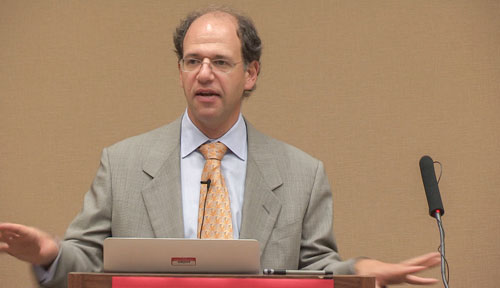If the face of health care in Nebraska is changing, this week’s conference at UNMC — attended by approximately 160 health care stakeholders and policymakers from across the state — may have an effect on its final image.
Experts in primary care and specialty health care delivery, hospital medicine, health care education and patient advocacy, among others, participated Wednesday in a day-long meeting at UNMC to discuss the future of health care in Nebraska.
|
The focus of the event was LR 22, a legislative resolution introduced this year by Sen. Kathy Campbell of Lincoln and Sen. Mike Gloor of Grand Island. LR 22 seeks to transform Nebraska’s health care system by bringing together a large group of stakeholders working together with the shared objectives of controlling health care costs and improving health care quality.
- Hear Sen. Campbell speak on conference goals here.
- Hear Sen. Campbell speak on stakeholder input here.
- Hear Sen. Gloor speak on the conference here.
- Hear Alan Weil speak on goals for the conference here.
Sen. Campbell said the conference exceeded her expectations, and she praised UNMC and its leadership, saying the university’s extraordinary care and partnership in formulating the state’s health agenda for the next 15 years affirmed its commitment to a healthy Nebraska.
Sen. Campbell said she was pleased with the participation of representatives from the entire spectrum of health care.
“It set the stage for stakeholders and policymakers to unite and focus in a purposeful process for this long-range plan,” she said.
Sen. Gloor was also pleased with Wednesday’s turnout.
“Attendance was going to be a measure of success, so when I walked in and saw the number of people that were actually there, I knew immediately we were going to have a good session,” he said. “We had invited a cross-section of people we thought would be beneficial to the overall dialogue. When they showed up, you knew that — given the interest and quality of the people in attendance — it was going to be a good day for us.”
Alan Weil, executive director of the National Academy for State Health Policy (NASHP), was the keynote speaker. A frequent speaker on national and state health policy, Medicaid, federalism, and implementation of the Affordable Care Act, Weil spoke on “Building a State Health Plan for Nebraska.”
The intent behind the event was to brainstorm a vision or plan for what Nebraska health care should look like in 15 or 20 years.
“It’s not a mandate, but it can serve as a guide for policy making in the upcoming years,” Sen. Gloor said.
